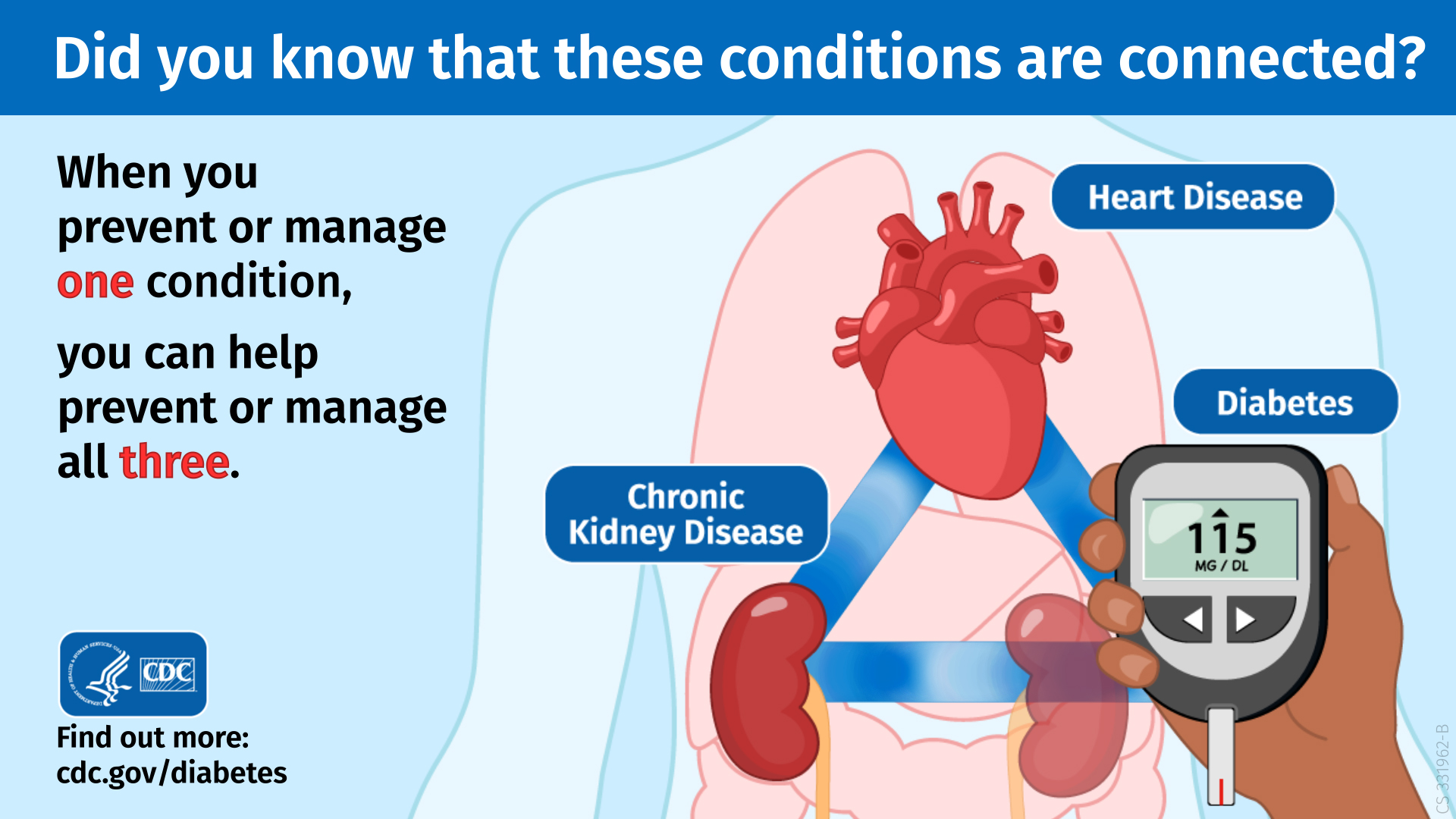Key points
- Chronic kidney disease (CKD), diabetes, and heart disease are connected.
- Find out why and how you can prevent or manage all three.

About CKD, diabetes, and heart disease
The relationship between CKD, diabetes, and heart disease is one example of the ways our organs are connected. When one organ isn’t working properly, it can put stress on other organs, causing them to stop working properly as well.
Your body uses a hormone called insulin that moves sugars from the blood and into your body's cells for energy. If someone has diabetes, they either don't make enough insulin or can't use the insulin well.
If someone has CKD, their kidneys don't filter out toxins and waste from their blood as well as they should.
Heart disease refers to several types of heart conditions. The most common condition, coronary artery disease, leads to changes in blood flow to the heart. This can cause a heart attack.
Make the connection
So how are these three conditions connected? Risk factors for each condition are similar and include:
- High blood sugar.
- High blood pressure.
- Family history.
- Obesity.
- Unhealthy diet.
- Physical inactivity.
High blood sugar can slowly damage the kidneys. Over time, they may stop filtering blood as well as they should, leading to CKD. Approximately 1 in 3 U.S. adults with diabetes has CKD.
When the kidneys don't work well, it puts stress on the heart. When someone has CKD, their heart needs to pump harder to get blood to the kidneys. This can lead to heart disease, the leading cause of death in the United States. Change in blood pressure is also a CKD complication that can lead to heart disease.
Tips to prevent or manage all three
The good news is that you can manage or prevent CKD, diabetes, and heart disease all at once. These five tips can help you get started:
Get active
Being active can help prevent or manage CKD, diabetes, and heart disease. Find an activity you like, start small, and get moving!
Choose healthy foods and drinks
This is an important way to give your body the fuel it needs to function properly. Adding more fruits and veggies to your plate can also help you keep a healthy weight. This is a great way to prevent or manage CKD, diabetes and heart disease.
Quit smoking
Quitting is one of the best things you can do for your health. It'll help you prevent CKD, type 2 diabetes, and heart disease. It also helps to improve any of these conditions if you have them. You don't have to do it alone! For support, visit I'm Ready To Quit.
Find out your risk for prediabetes
Know where you stand by taking this 1-minute prediabetes risk test. If your risk is high, talk to your doctor about taking action to prevent or delay type 2 diabetes. The lifestyle change program through CDC's National Diabetes Prevention Program can help you build the healthy habits you need to succeed.
Get your annual flu shot
People with chronic diseases are more likely to have health complications if they catch the flu. These complications can worsen an existing condition and can even be fatal.
Protect your heart if you have CKD
Over time, CKD often gets worse and can lead to kidney failure. People with kidney failure will need regular dialysis (a treatment that filters the blood) or a kidney transplant to survive.
Heart disease is the most common cause of death for someone on dialysis. When your kidneys don't function properly, the heart has to work harder to circulate blood. This may lead to high blood pressure and possibly heart disease.
Tips to help protect your heart and kidneys:
Choose foods that are healthiest for your heart and your kidneys. Ask your doctor for a referral to a dietitian to understand which foods and drinks are best for you. Learn more about dialysis and a healthy diet.
Get regular physical activity to help lower your blood pressure and improve your heart health. And remember that moving more doesn't have to be strenuous. Some great ways to get active are gardening, yoga, or brisk walking around the block. Ask your doctor about which activities are best for you and if there are any you should avoid.
Manage your weight and blood sugar by changing your diet and activity routine. For extra help, you can work with a dietitian to create an eating plan that works for you and your kidneys.

